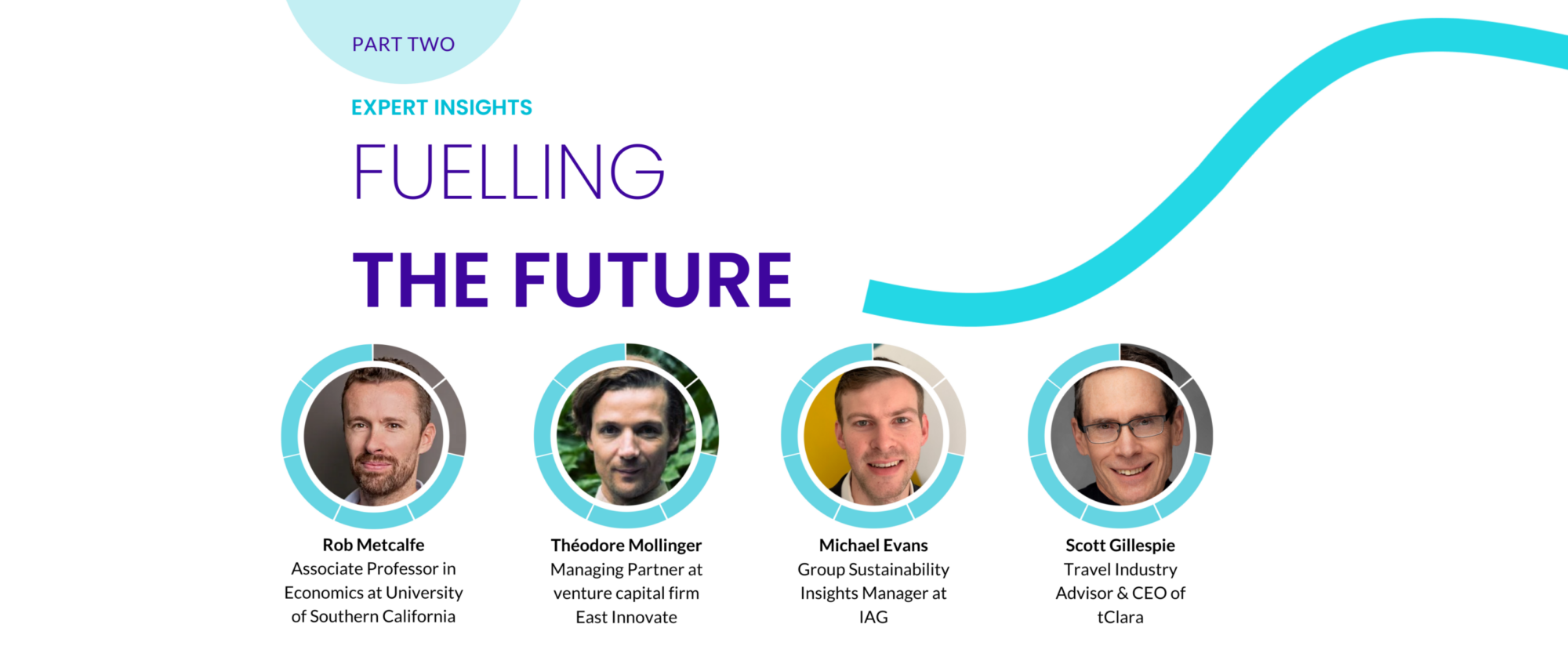Effective policy must accompany tech
Théodore Mollinger, Managing Partner at venture capital firm East Innovate:
“Policies will play a big role in driving the implementation of cleaner fuels/efficient technologies, but also the collaboration between countries and companies.”
Michael Evans, Group Sustainability Insights Manager at International Airlines Group (IAG):
“For technology to successfully deliver the volume of emission reductions we need to limit global temperature warming to 1.5C, this must be combined with effective policy and investment support.”
Robert Metcalfe, Associate Professor in Economics at University of Southern California:
“Overall, a holistic approach that combines technological innovation with informed human behaviour, and the right supportive policies and prices is essential for the successful decarbonization of shipping and aviation industries.”
Airlines must get ahead of consumer demand
Robert Metcalfe, Associate Professor in Economics at University of Southern California:
“We know that as societies get richer, they demand more air travel, so efficiencies in fuel demand need to be well ahead of airline demand from consumers for us to reach decarbonisation targets.”
Michael Evans, Group Sustainability Insights Manager at International Airlines Group (IAG):
“We know that our customers are concerned about the climate change impacts of flying but we have not seen any discernible reduction in flying levels due to these concerns. The key for IAG is to implement solutions to mitigate the impacts of climate change to provide customers confidence that we can deliver net zero flying.”
Tech is the tool, sustainable behaviour is the goal
Robert Metcalfe, Associate Professor in Economics at University of Southern California:
“The relationship between human behaviour and technology lies in the adoption of sustainable practices. While technology can offer solutions, its effectiveness is contingent on human acceptance and adherence.
“Human behaviour is integral to the journey to net zero, especially in terms of consumer choices, travel preferences, and business and management practices. Signol is a great example of the importance of human behaviour for net zero.”
Théodore Mollinger, Managing Partner at venture capital firm East Innovate:
“Operational efficiency is driven by human behaviour – fuel consumption is driven by staff decisions. Training and motivating staff is critical to adopt fuel-saving practices. Data-driven solutions to optimise routes need to be implemented by people, this requires education and motivation.”
Some sustainability challenges ‘resist’ tech solutions
Robert Metcalfe, Associate Professor in Economics at University of Southern California:
“Despite technological strides, certain sustainability challenges in shipping and aviation may resist effective technological solutions. For instance, the environmental impact of manufacturing new, more sustainable aircraft or vessels, and the disposal of older, less efficient models pose challenges. Additionally, the transition to alternative fuels may bring about logistical and supply chain issues that require comprehensive policy and regulatory frameworks to address. ”
Théodore Mollinger, Managing Partner at venture capital firm East Innovate:
“Entirely replacing carbon fuels with clean alternatives is a major challenge due to the lack of incentives (in certain countries), but also the lack of current infrastructure (for example for the implementation of hydrogen or ammonia) and the massive costs that come with it. To be effective and massively scalable, new technologies can’t be just cleaner. They also need to be cheaper and more secure/available.
“Achieving a similar energy density of SAF is currently challenging. A lower density affects the range and performance of planes.
“Other challenges include the fact that currently ships also pollute through oil spills and ballast water discharge. More regulations, tech and behavioural change are needed here. Finally, changing production lines can be very expensive and slow (especially in aviation) due to long (safety) certification processes.”
Economics has a role to play in airline decarbonisation
Scott Gillespie, travel industry advisor and CEO of tClara:
“A better form for tracking an airline’s carbon intensity is to use its revenues or ticket price in the denominator (rather than capacity-based measures i.e. per passenger). By using a revenue-based denominator, airlines will reduce their carbon intensity by either becoming less reliant on fossil fuels, and/or raising their ticket prices. The latter is much easier than the former and has the big benefit of reducing demand. Do this, and the airline will reduce its absolute emissions, which is the core requirement for any airline serious about decarbonizing itself.”
Robert Metcalfe, Associate Professor in Economics at University of Southern California:
“Awareness and acceptance of sustainable travel options, such as choosing lower-emission transportation modes or supporting airlines and shipping companies with robust environmental policies, can significantly contribute. Additionally, responsible energy consumption practices and lifestyle choices impact the overall success of decarbonization initiatives. However, as an economist, I have to argue that the prices have to be right too, in that the social damage from greenhouse gas emissions should be factored into the fuel price (e.g., a carbon tax).”
You can read part one of this mini-series published in November 2023 here.

